A Presentation About the New Game-Theatre And Its Political Relevance at the Conference rePLAYCE the:City in Zürich
Playing Democracy
by Christian Rakow
Zürich, 9. November 2013. I must admit, I was a bit surprised when I noticed that my presentation on Game-Theatre had been announced with the title "Playing Revolution". Revolution for me is a political and historical category. And as far as I can see, there is no evidence of a revolutionary situation at the moment, neither here in Switzerland nor in Germany. Therefore an attempt to "play revolution" can quite easily end in a farce (to speak with Karl Marx). But this, sorry to say, happens quite frequently in German speaking theatre. Because this "playing revolution", or rather "playing with the gesture of revolution" can be found all over the place.
Let me give you one example from a recent state theatre production, for I believe that Game-Theatre gives an important answer to these "aesthetics of the revolutionary". It concerns the latest production of Henrik Ibsen's An Enemy of the People by Thomas Ostermeier at the Schaubühne Berlin. The play, as you know, starts with quite a specific conflict: In the course of hygienic investigations the physician Thomas Stockmann finds out that the public swimming pool in his town is in such a bad condition that it should be closed and renovated. Due to economic reasons, Stockmann's brother, who is a part of the local government, refuses to shut down the pool and forces the local newspaper to start a campaign against Stockmann instead. Under pressure Stockmann becomes more and more of a radical. On the peak of the conflict, during a debate in the community center, he rages against the government and the majority's power of opinion. He becomes, in the words of the play, the "enemy of the people".
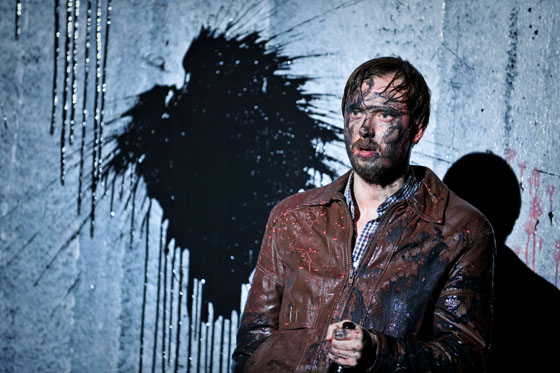 Dr. Stockmann (Stefan Stern) calls for revolution at the Schaubühne Berlin. © Arno Declair
Dr. Stockmann (Stefan Stern) calls for revolution at the Schaubühne Berlin. © Arno Declair
In the Berlin production, for this climax Thomas Ostermeier equipped Stockmann with the well-known internet-manifesto The coming insurrection. It is one of the prevalent manifestos against the conditions of living in late capitalism and against the exhaustion of democracy. While Stefan Stern, as Stockmann, worked himself up proclaiming this manifesto, other actors stood in the middle of the audience and tried to manipulate and spur the crowd. In the heat of the moment everything was at stake, only the big picture mattered, while the swimming pool was long forgotten. The revolution seemed near – at least from the point of view of the production. Actors spoke directly with spectators, asking what they thought of Stockmann's manifesto: "What would you do?" one of the performers addressed the audience. And a lady replied disarmingly soberly: "Well, repair the swimming pool." Obviously, while aiming at the bigger picture, the production had failed to keep in touch with the logic of the plot. And so it received a bit of down-to-earth common sense by the spectator.
Smart-ass boundaries
I believe that a scene such as this is quite exemplary for many theatre productions today. Frequently directors try to boost plays by adding foreign text material, they associate various contexts. But what is often missing is the link between the external discourse and the microstructure of the plot. As a result, theatre tends to become a space for flowery phrases. In flowery phrases you will hear only the most generalized topics, and you will miss what is actually happening.
One can also look at this problem in a more fundamental way. That's what the author and dramaturge Björn Bicker recently did at the jubilee congress of the Burgtheater Vienna. He revealed the political side of the issue. Bicker argued that in the course of modern director's theatre (Regietheater), the stage has developed a certain elitism or snobbism (not so much in the works of Frank Castorf but rather in those of his many imitators by the way). Bicker called it the "bildungshuberische Barrieren" of theater, which might translate as "smart-ass boundaries". In the course of my argument that means: Way too often theatre productions take for granted that spectators know the play in advance, way too often they dismiss the story in favor of allusions and connotations, which then get explained in the program or in talks by the dramaturge after the performance. By this, however, the events on the stage itself lose their integrative power. In the end, such production address only those well informed theater-goers who already possess the previous knowledge necessary to decipher the performance and its reference systems.
The postdemocratic challenge
Against this background Bicker called for a "Theatre of Participation". Such a "Theatre of Participation" lowers the thresholds and invites people to negotiate their everyday experiences in a very practical and concrete way. To return to my initial doubts: I think such a "Theatre of Participation" is way more important than the flowery "Playing Revolution". For, of course, there are a lot of deficiencies in our contemporary society. To speak with Colin Crouch: In post-democracy, the state in which we live, there is a lack of political participation of the citizens, a shift of power from the parliament toward lobbies and focus-groups. The growing heterogeneity of social classes makes it increasingly difficult to form the political will from the bottom-up. In this situation, I think, theater plays an important role: It can develop a centripetal force to prevent society from falling apart into a plurality of parallel societies. So in this sense I prefer "Playing Democracy" to "Playing Revolution".
Björn Bicker developed his vision of a "Theatre of Participation" in city projects and documentary projects. In Munich, for example, he brought different religious groups in contact with each other (in his project Urban Prayers at Münchner Kammerspiele). In my opinion another important format within the "Theatre of Participation" is what I'd like to call the "Game-Theatre". "Game-Theatre" explicitly refers to computer games as a source of inspiration. It is essentially interactive, which means the shape of the artwork itself is dynamically influenced by the action of the gamer, who acts according to a set of rules. How the theatrical event will take place is up to the gamer's choices.
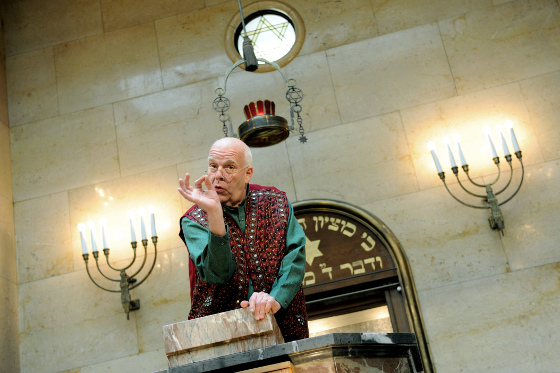 The project "Urban Prayers" in a synagogue in Munich. © Andrea Huber
The project "Urban Prayers" in a synagogue in Munich. © Andrea Huber
It could also be different
Compared to the documentary theatre, the "Game-Theatre" is still in the early stages. Even outstanding groups such as machina eX are just beginning to explore the possibilities of the adventure-game format. But one can already grasp the potential of this new art form: Game-Theatre sets the focus on events, which – at least in the works of machina eX – form a story. Once you come out of a performance of machina eX you start talking very practically about what you've experienced and how it amounts to a bigger narrative. Logical conjunctions of events and thus the coherence of the storyline actually receive full attention. This also means: One can enter into such an evening with practically no previous knowledge, because everything that is necessary in order to understand what's going on is produced within the framework of the production itself.
In their financial-market-adventure Hedge Knights, which as you know can be seen here in the Gessnerallee during our conference days, there are, as far as I know, eight different possible endings to the story, depending on how gamers make their decisions during the one hour performance. In this variability lies a basic advantage of the Game-Theatre as opposed to the documentary theatre. Documentary theatre is first and foremost a genre with a strong focus on reports. You will find people reporting job experiences, episodes from their biography, or incidents in their life, and so on. "That's how it is", is the main message of the documentary theatre. And with this approach it converges with journalism. Way too often it fails to aesthetically compose its material; frequently it presents the reports merely in a catalogue like manner.
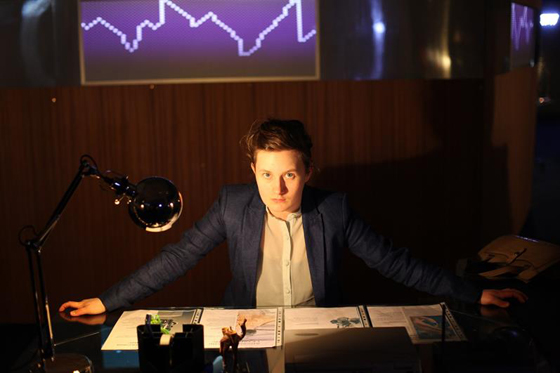 Laura Naumann in "Hedge Knights" by machina eX 2013 at the HAU Berlin. © Paula Reissig
Laura Naumann in "Hedge Knights" by machina eX 2013 at the HAU Berlin. © Paula Reissig
Contrary to this, Game-Theatre in its constructivist method focuses on possibility rather than on actuality. Its message basically is: "It could also be different." And as its plot is never automatically given, but rather displayed as open to changes by interaction, it in fact stands in the tradition of aesthetic modernism: Ever since Russian Formalism, art has been concerned with displaying the artificiality of an artwork, denaturalizing symbolic signs, and focusing on the way artifacts are produced.
The second major aspect of Game-Theatre is its capacity for cooperation. "Hedge Knights" is played in groups of about ten people, who work together solving riddles and deciding what step to take next in order to advance the plot (the characters then perform the action according to the input, so they act as avatars of the group). In "Hedge Knights", you decide for instance whether you want to invest on the market with short or long term options, whether you go for high return on investment or whether you help the journalist Denise to reveal the racketeering that is going on in the hedge fund, where the story takes place.
By constantly pushing the gamers to make choices which the whole group can cope with Game-Theatre produces political relevance. It becomes a space where individual preferences are being negotiated and conflicts are being dealt with. Thus it offers a course for probing fundamental democratic competences.
Freedom of choice in an artificial world
The political capacity of this new art form is maybe even more visible in a second genre which can be called "Open World Games", using a term from computer game terminology. While in works of machina eX the gamer acts within the framework of a multi-linear script in order to produce a linear story, in "Open World Games" the freedom of choice is even greater. Here the gamer explores a whole artificial topography quite independently. There are tasks and little stories in this open world, here and there, but there is no one meta-plot formed by the gamer's action.
Such an Open World Game was staged at the Theater of Freiburg last July bearing the title Regiodrom, and for me it was one of the most impressive game-theatre experiences this year. Director Klaus Gehre and Games Designer Lev Ledit used the square in front of the theatre and various rooms inside the theatre itself in order to set up a kind of gold rush boom town.
Let me shortly give you an overview of the topography of this "Regiodrom": Outside on the square there was the mine, where gamers were digging sand and searching for gold nuggets. The work in the mine was payed in "Blüten" (blossoms), the fictional currency of "Regiodrom". One was not allowed to take any kind of "real" money into the game world. Inside the theatre building you could earn money with various kinds of services (like playing the piano at the café, dancing or being a reporter for the internal TV-Station that was set up for the coverage of life in "Regiodrom"). For most gamers, however, working in the mine was the main source of income.
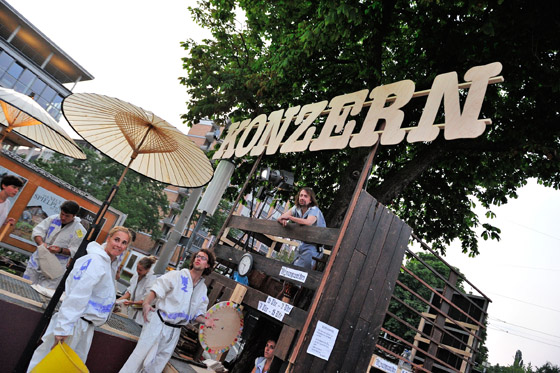 Klaus Gehre's Open-World-Game "Regiodrom" 2013 in Freiburg. © Maurice Korbel
Klaus Gehre's Open-World-Game "Regiodrom" 2013 in Freiburg. © Maurice Korbel
Social experiment
Besides the economic set-up there was a political entity: the village. Once you entered "Regiodrom", you had to join one of two villages in order to coordinate your activities with other people. There was a sort of competition between the two villages regarding which one would make its inhabitants happier (the staff of "Regiodrom" permanently measured happiness by a "happiness index"). But competition was not the main target. The village was rather designed for the self-management of the group. For this reason there were regular elections of a mayor and a government.
Finally and perfidiously, the so called "underworld" was opened in a basement in the evening hours of the day. There the gamer could buy alcohol, gamble and or indulge herself on the dance floor. This "underworld" used a credit system to foster the lust for speculation. You had to exchange your "Blüten"-currency when entering, and you could not transfer your profit to the main "Regiodrom" world once you left.
In this setting a 20 hour-social experiment was staged. Some people turned into free-riders (Trittbrettfahrer), finding leaks in the credit system of "Regiodrom" and forging checks to spend a luxurious night in the underworld. Myself, I was a little more modest and that led to one of my most memorable theater experience in recent months: At 2.30 a.m., I was spending another half an hour digging sand in the mine (with these hands!), just to spend my honest wage afterwards on one more bottle of beer. The prices had gone crazy in the meantime.
But "Regiodrom" did not only bring out the individualist or Epicurean in people. It also helped to test democratic hopes in the village community. There was a lot of disappointment, but not only. Let me tell you about the disappointment first: During those 20 hours of "Regiodrom", our village elected only three different mayors, even though there was an election every two hours. The participation in the elections was shrinking radically as time went by. Obviously one could quite comfortably live in "Regiodrom" being a gambler in the basement or a hard-working miner, a reporter, a piano player, or whatsoever. In this respect the game was not challenging enough.
How do we pay the subsidies income?
However, there was another reason for the political failure. Quite early on, severe difficulties occurred in our village that weakened the confidence in the political sphere. The first relevant law our village established with a vast majority was to introduce a so called subsidies income – which in German left wing politics is a widely discussed concept for a new civic society (and of course you could bet on the habitually left wing theatre-goer to come up with an idea like this).
Still, afterwards we could not agree on an idea how to model our tax system, how to keep the monetary situation of each of us transparent or how to organize the whole financial structure of the village. Neither could we establish regular meetings. In short, a thriving individualism and a lust for anarchy prevented us from establishing an equal income on a solid socialist basis. Albeit that is an insight on its own, of course: Within our community the subsidies income existed only as flowery phrase (to use the term from the beginning of my speech).
But there were also promising moments: Cooperation within the village, and even between the two villages, started after only a few hours – once the mine was used up. All of a sudden we ran short of labor, recession spoiled the mood. And almost immediately people gathered to work on so called research assignments, in order to help discover deeper sections of the mine. These assignments were mainly riddles and puzzles. You could call it a real machina-eX-moment: You had to solve a problem in order to advance in your experience.
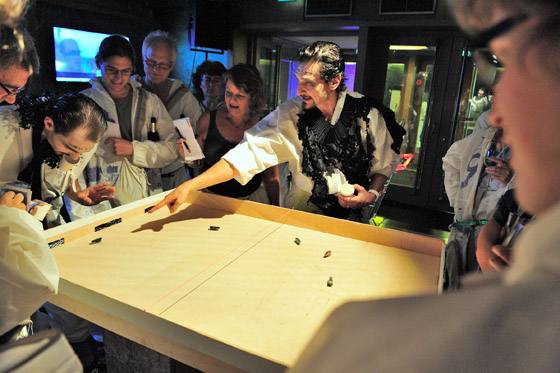 Playing Underworld: Klaus Gehre's Open-Word-Game "Regiodrom". © Maurice Korbel
Playing Underworld: Klaus Gehre's Open-Word-Game "Regiodrom". © Maurice Korbel
Changing reality
To put it in more general terms, this is a common feature of these two Game-Theatre-formats: The more practical a problem appears and the clearer you can see what you're aiming at, the stronger your motivation to cooperate. The actual situation, the precise challenge activated people – not the flowery phrases. In a theatre like this we are quite a long way off the pathos of revolution, but not off the will to change reality, not off a reflection of individual and social necessities. The game unfolds its own poetry of creative power.
I believe that we will see a rapid development of this Game-Theatre-genre rather soon. Imagine discussing local political issues in a world like "Regiodrom": Is our village supposed to have a mosque or a Christian church? Should we build a football field or a swimming pool? How much should we invest? And how will we organize ourselves? This to me seems to be the political capacity of an advanced Game-Theatre: It is a "Theatre of Participation", a laboratory to investigate how we want to live together.
Thank you very much.
This presentation was held on November 9th 2013 at the conference "rePLAYCE: theCity". Switch to the German version.
All English texts on nachtkritik.de are listed here.
Conference rePLAYCE: theCity
by trans4mator and the Zürcher Hochschule der Künste
at Theaterhaus in der Gessnerallee Zürich
gamedesign.zhdk.ch
Wir bieten profunden Theaterjournalismus
Wir sprechen in Interviews und Podcasts mit wichtigen Akteur:innen. Wir begleiten viele Themen meinungsstark, langfristig und ausführlich. Das ist aufwändig und kostenintensiv, aber für uns unverzichtbar. Tragen Sie mit Ihrem Beitrag zur Qualität und Vielseitigkeit von nachtkritik.de bei.
mehr porträt & reportage
meldungen >
- 17. April 2024 Autor und Regisseur René Pollesch in Berlin beigesetzt
- 17. April 2024 London: Die Sieger der Olivier Awards 2024
- 17. April 2024 Dresden: Mäzen Bernhard von Loeffelholz verstorben
- 15. April 2024 Würzburg: Intendant Markus Trabusch geht
- 15. April 2024 Französischer Kulturorden für Elfriede Jelinek
- 13. April 2024 Braunschweig: LOT-Theater stellt Betrieb ein
- 13. April 2024 Theater Hagen: Neuer Intendant ernannt
- 12. April 2024 Landesbühnentage 2024 erstmals dezentral


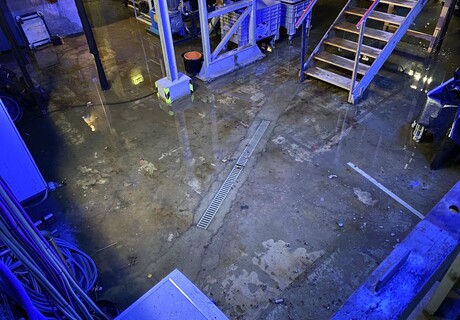
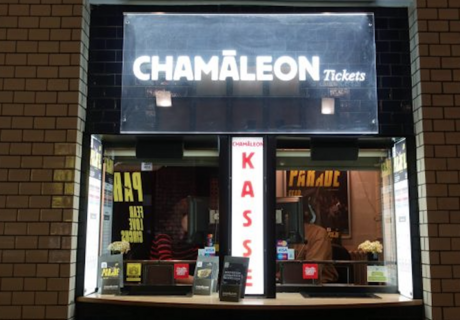
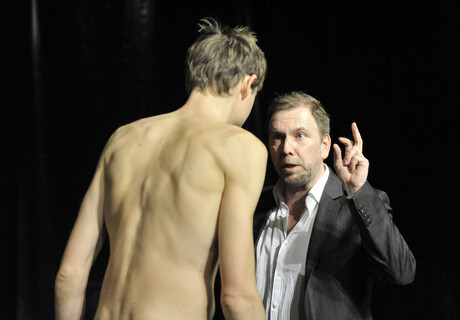
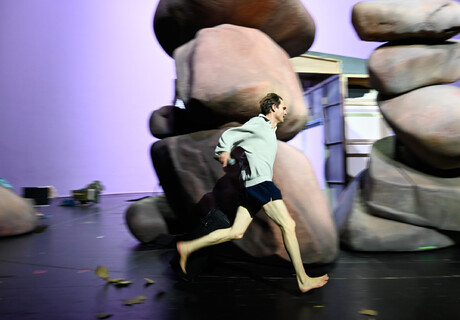
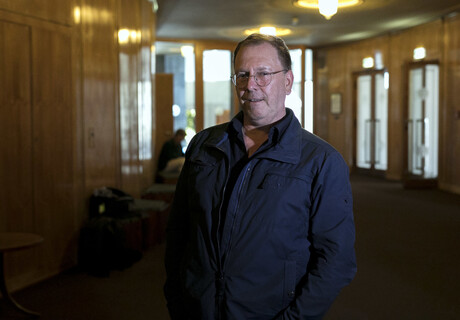
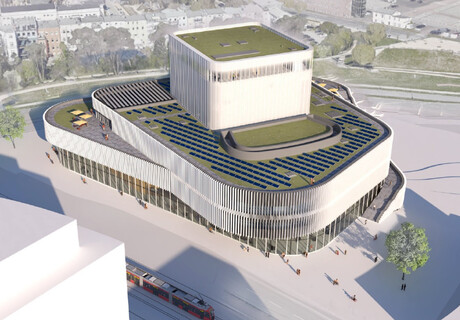
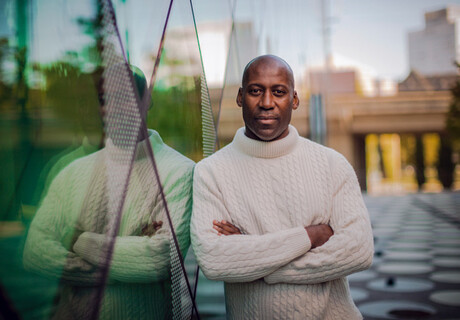

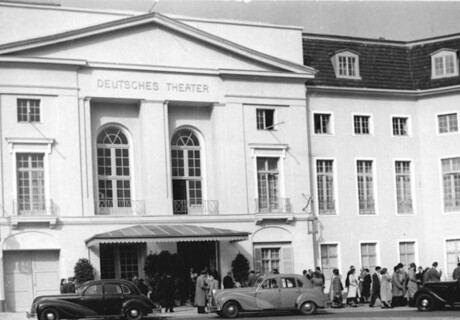
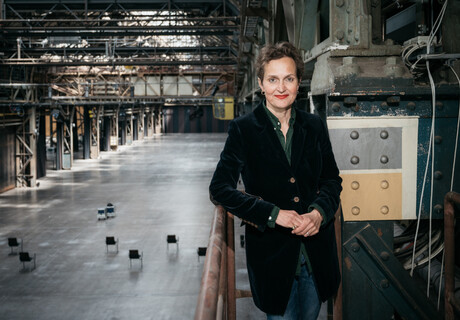
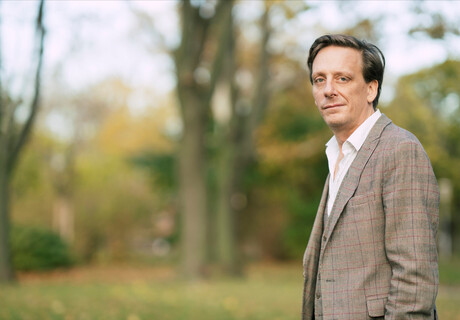

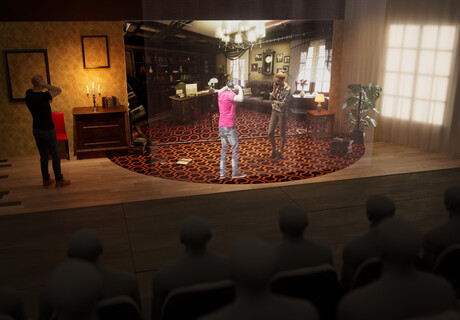
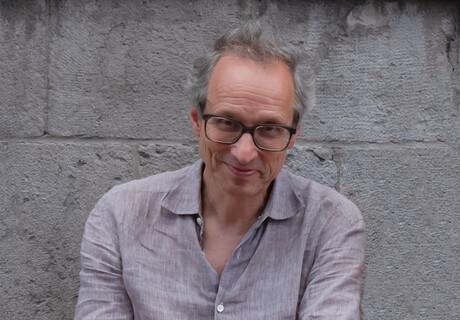
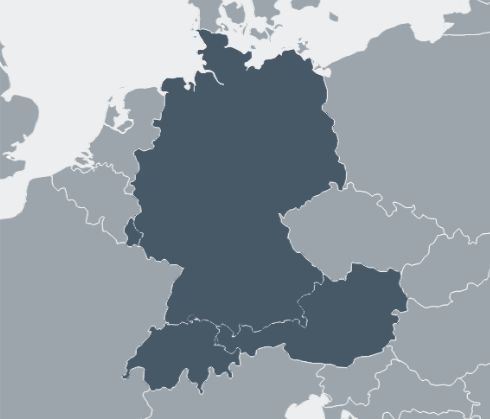
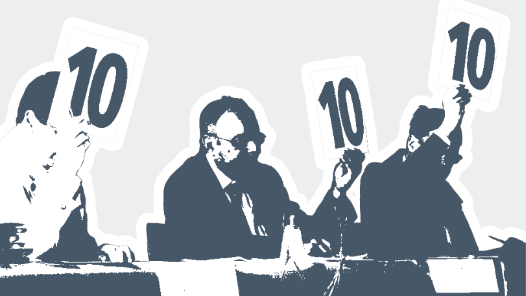
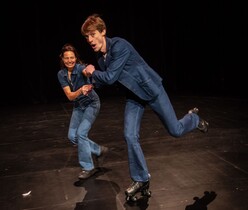

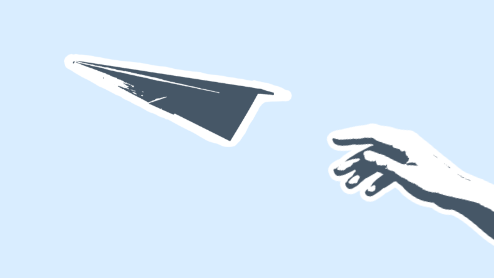

neueste kommentare >